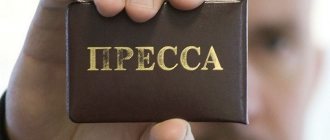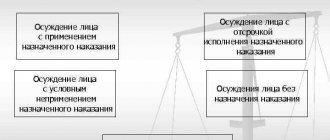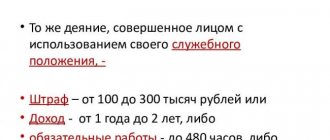The criminal law of the Russian Federation provides for liability for obstructing legal business or other activities - Art. 169 of the Criminal Code of the Russian Federation.
According to the disposition of Art. 169 of the Criminal Code of the Russian Federation, obstruction of legitimate business activity is understood as an illegal restriction of independence or other illegal interference in the activities of an individual entrepreneur or legal entity, committed by an official using his official position.
This crime is an encroachment on freedom of enterprise, a gross violation of Art. Art. 8, 34 of the Constitution of the Russian Federation guarantees of entrepreneurial activity. Obstruction of legitimate business activities may consist of various types of actions or inaction of officials such as: unlawful refusal to register, issue a license, evasion of registration, evasion of a license, restriction of independence, other illegal interference in their activities.
Illegal interference in the activities of an entrepreneur can be committed by any officials of state bodies, local government bodies, law enforcement officers using their official position and is associated with the exercise of the rights and obligations with which this person is endowed by virtue of his position.
Restrictions on the rights of entrepreneurs can only occur on the basis of federal legislation, which, in order to protect the constitutional system, morality, health, rights and legitimate interests of other persons, provides for restrictions for entrepreneurs on certain types of entrepreneurial activities.
Intervention by state bodies and their officials in the activities of business entities is lawful only in connection with the implementation of the powers established by law to limit monopolistic activities and suppress unfair competition, exercise state control and supervision over compliance with mandatory requirements of state standards.
In accordance with the requirements of Art. 15 of the Federal Law “On Operational-Investigative Activities” and Order of the Ministry of Internal Affairs of Russia No. 249 dated March 30, 2010 “On approval of instructions on the procedure for employees of internal affairs bodies to carry out public operational-investigative activities, inspection of premises, buildings, structures, areas of terrain and vehicles” ( hereinafter referred to as the Instructions), the decision to conduct a public operational measure to inspect the premises is made by the head of the internal affairs body, or his deputy, by issuing an appropriate order in the established form. Before making a decision to schedule an inspection of the premises, the head of the internal affairs agency or his deputy studies the report of an employee of the operational unit, which sets out:
specific data indicating the presence of signs of a crime being prepared or committed;
information about events that pose a threat to the economic security of the Russian Federation;
measures taken to obtain information confirming the reliability of the available information, and their results, which preceded the conclusion of the operational unit employee about the need to conduct an inspection of the premises;
date, time, place and planned duration of the premises inspection.
The order is registered in a special journal, with an individual number assigned to it.
The order to conduct a premises inspection must indicate:
- number of the resolution;
— grounds for conducting operational investigations;
— the name of the legal entity in which it is planned to conduct the survey and the address at which it is located;
— Full name and position of operational employees who are entrusted with conducting the survey;
— a list of powers of the specified operational employees.
A copy of the order must be handed over, against signature, to a representative of the company in which the examination is being carried out.
When conducting an examination, a police officer has the right to seize documents (or copies thereof) and objects. The seizure of documents must be carried out with the mandatory drawing up of a protocol, which must meet the requirements of criminal procedure legislation. The protocol must be drawn up in 2 copies, one of which is given to an individual or a representative of a legal entity.
The protocol describes the actions in the order in which they were carried out, and also sets out the statements of the persons involved in the seizure.
To certify the progress and seizure of documents and items, at least two capable citizens who are not interested in the outcome of the seizure are invited.
When documents are seized, copies are made of them, which are certified by the official who seized the documents and handed over to the person from whom the documents were seized, which is recorded in the protocol. If it is impossible to make copies or transfer them simultaneously with the seizure of documents, the specified official transfers certified copies of the documents to the person from whom the documents were seized within 5 days after the seizure, which is recorded in the protocol.
Documents, objects, materials that are directly related to the examination being carried out, or objects seized from civilian circulation (drugs, weapons, etc.) are subject to seizure.
If, after 5 days after the seizure of documents, certified copies of documents were not transferred to the person from whom the documents were seized, certified copies of documents must be sent by registered mail within 3 days, which is recorded in the protocol indicating the postal number departures.
Before seizing documents stored on electronic media, police officers conducting the examination are also required to provide the opportunity to make copies of such documents.
Prepared by the Directorate for Supervision of Investigation, Inquiry and Operational Investigative Activities of the Prosecutor's Office of the Samara Region
Commentary to Art. 169 of the Criminal Code of the Russian Federation
1. The disposition of the article requires a restrictive interpretation, since Art. 169 is placed in the chapter “Crimes in the field of economic activity”, therefore, the generic object is the established procedure for carrying out precisely economic, and not any other activity of citizens and legal entities. Therefore, it seems that the crime in question is an encroachment on the freedom and guarantees proclaimed by the Constitution of the Russian Federation (Articles 8 and 34) to carry out entrepreneurial and other economic activities not prohibited by law.
2. Entrepreneurial activity is understood as independent activity carried out at one’s own risk, aimed at systematically obtaining profit from the use of property, sale of goods, performance of work or provision of services by persons registered in this capacity in the manner prescribed by law (Clause 1 of Article 2 of the Civil Code of the Russian Federation ). Participants in entrepreneurial and other economic activities have an equal right of access to the market, material, financial, labor, information and natural resources. They have the right to independently, within the limits established by federal laws, choose the scope of their activities, dispose of property, determine the volume of production, the procedure and conditions for the sale of products, and distribute profits. Refusal to register a business activity on the grounds of inexpediency, refusal to issue a license on grounds not provided for by law, any discrimination against business entities and other illegal interference in this activity by government bodies and officials are unacceptable.
3. On the concept of a legal entity, see Art. 48 Civil Code of the Russian Federation.
4. The objective side of obstructing the legal business or other activities of a citizen, an individual entrepreneur or legal entity, may consist in various types of actions or inactions of officials, such as: 1) unlawful refusal of state registration of an individual entrepreneur or legal entity; 2) evasion of their registration, when an official, without formally refusing to register, nevertheless, under some far-fetched pretext or without any pretext at all, does not do this; 3) unlawful refusal to issue a special permit (license) for the right to carry out certain activities when such permission is necessary; 4) evasion of issuing a special permit (license); 5) restriction of the rights and legitimate interests of subjects of business or other activities, depending on the organizational and legal form; 6) restriction of independence of an individual entrepreneur or legal entity; 7) other illegal interference in their activities.
5. In accordance with the requirements of civil legislation (Articles 23 and 51 of the Civil Code of the Russian Federation), individual entrepreneurs and legal entities are subject to mandatory state registration. According to the Federal Law of 08.08.2001 N 129-FZ “On State Registration of Legal Entities and Individual Entrepreneurs”, state registration of legal entities and individual entrepreneurs are acts of the authorized federal executive body, carried out by entering information on creation, reorganization and liquidation into state registers legal entities, acquisition by individuals of the status of individual entrepreneur, termination by individuals of activities as individual entrepreneurs, other information about legal entities and individual entrepreneurs.
———————————
NW RF. 2001. N 33 (part I). Art. 3431.
The law establishes a list of necessary and sufficient documents that must be presented during state registration of legal entities and individual entrepreneurs. In all cases, state registration is carried out within no more than five working days from the date of submission of documents to the registration authority. The decision to refuse state registration must be made within the same period as the decision to register. In this case, refusal is possible if there is at least one of the violations provided for by the said Federal Law (Clause 1, Article 23): a) failure to submit the documents required for state registration specified by the Federal Law; b) submission of documents to an improper registration authority.
State registration of an individual as an individual entrepreneur is not allowed if his state registration in this capacity has not expired, or a year has not elapsed from the date of the court’s decision to declare him insolvent (bankrupt) due to the inability to satisfy the claims of creditors related to the previously carried out him entrepreneurial activity, or a decision to forcibly terminate his activities as an individual entrepreneur, or the period for which this person is deprived of the right to engage in entrepreneurial activity by a court verdict has not expired (Clause 4, Article 22.1 of the Federal Law “On State Registration of Legal Entities and individual entrepreneurs").
The specifics of state registration of credit organizations are established by Federal Law No. 395-1 of December 2, 1990 “On Banks and Banking Activities”. A special procedure for state registration has also been established for chambers of commerce and industry, public and religious associations and, in general, for non-profit organizations.
———————————
NW RF. 1996. N 6. Art. 492.
6. The main regulatory act regulating the list of types of activities for which a special permit (license) is required, and the licensing procedure, is the Federal Law of 08.08.2001 N 128-FZ “On licensing of certain types of activities”. Licensing activities are carried out by federal government bodies and executive authorities of constituent entities of the Russian Federation.
———————————
NW RF. 2001. N 33 (part I). Art. 3430.
The law defines a list of documents submitted to the relevant licensing authority, which can be clarified depending on the specifics of the activity in the regulations on licensing the relevant type of activity. It is prohibited to require the applicant to submit documents not provided for in the Licensing Regulations. The licensing authority checks the completeness and accuracy of information about the license applicant contained in the submitted documents, as well as checks the ability of the license applicant to comply with license requirements and conditions.
The decision to issue or refuse to issue a license, as a rule, must be made within 45 days from the date of receipt of the application for a license with all the necessary documents. Shorter deadlines for making a decision may be established by regulations on licensing specific types of activities. Within the same period, the licensing authority is obliged to notify the license applicant in writing of the decision to grant a license or to refuse to grant it, indicating the reasons for the refusal.
The grounds for refusal to issue a license are: 1) the presence in the documents submitted by the license applicant of unreliable or distorted information; 2) non-compliance of the license applicant, the objects owned or used by him with the licensing requirements and conditions necessary for carrying out the relevant type of activity.
7. Evasion of state registration of an individual entrepreneur or legal entity or the issuance of a special permit (license) to carry out a certain activity means a deliberate failure by an official to fulfill his obligation to register or issue a license if there are legal grounds for this or (if there are legal grounds) within the established deadlines to refuse registration (issuance) of a license.
8. Restriction of the rights of an individual entrepreneur and a legal entity can only occur on the basis of federal legislation. In order to protect the constitutional system, morality, health, rights and legitimate interests of other persons, ensure the defense of the country and the security of the state, legislation provides for restrictions on the right of individual entrepreneurs and organizations to engage in certain types of business activities, establishes restrictions for obtaining a license, etc. .
The intervention of government bodies and their officials is lawful only in connection with the implementation of powers established by law to limit monopolistic activities and suppress unfair competition, licensing control, state control (supervision) over compliance with mandatory requirements of state standards, sanitary and epidemiological supervision, tax, currency and budget control, compliance with radiation and environmental safety requirements, suppression of violations of trade rules, etc.
9. Part 1 art. 169 contains the formal elements of a crime; the occurrence of any consequences when preventing legitimate business or other activities is not required for criminal liability to arise.
10. The subject of a crime is only an official (see note 1 to Article 285 of the Criminal Code).
11. The crime is committed intentionally. The official is aware that he is, without any legal basis, impeding or unlawfully interfering with legitimate business or other activities, and desires this. The motives for such behavior may be different.
12. An individual entrepreneur and a legal entity whose rights were violated by the illegal intervention of an official (refusal to register, issue a license, restriction of independence, etc.), in accordance with the Constitution of the Russian Federation (Article 46), civil legislation (Article Art. 11, 12, 13 of the Civil Code of the Russian Federation), arbitration procedural legislation (Article 198 of the Arbitration Procedure Code of the Russian Federation), as well as legislation on state registration and licensing, has the right to appeal the actions (inaction) of state authorities, local government bodies in court (arbitration court), by decision which acts of a state body or local government body may be declared invalid. In this case, repeated obstruction of legitimate business or other activities entails liability under Part 2 of Art. 169. The subject of this crime may also be another official. It is only necessary that it knows about the existence of a corresponding court decision that has entered into legal force.
13. The large amount of damage from obstruction of legitimate business or other activities (Part 2 of Article 169 of the Criminal Code) is calculated in an amount exceeding 1.5 million rubles. It can be expressed both in the form of real material damage, and, mainly, in the form of lost profits, i.e. in non-receipt of income that an entrepreneur or legal entity would have received if their rights had not been violated (Clause 2 of Article 15 of the Civil Code of the Russian Federation).
The guilt of an official in relation to major damage caused by his actions (inaction) can be either intentional in the form of direct or indirect intent, or careless.
14. Obstruction of legitimate business or other activities is a special norm in relation to abuse of official powers (Article 285 of the Criminal Code) and abuse of official powers (Article 286 of the Criminal Code), and obstruction in one form or another of legal business or other activities in violation of the entered into the force of a judicial act is also a special norm in relation to non-execution of a court verdict, court decision or other judicial act (Article 315 of the Criminal Code). By virtue of the rule enshrined in Part 3 of Art. 17 of the Criminal Code, when there is competition between general and special norms, criminal liability accrues according to the special norm (see commentary to Article 17).
15. A special case of obstruction of legitimate business activity is the prevention, restriction or elimination of competition committed by an official using his official position, which is provided for by a special norm (Part 2 of Article 178 of the Criminal Code).






